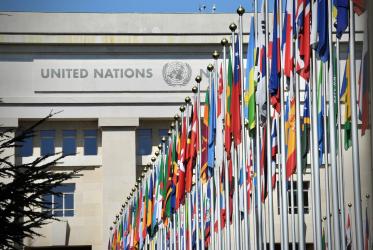Free photos available, see below
The World Council of Churches (WCC) central committee asked "all governments which have not yet ratified the Rome Statute for the International Criminal Court, and especially the United States, to ratify it promptly without reservations".
The call to the unwilling governments is part of a substantial statement on the International Criminal Court (ICC) approved one day before the end of the 15-22 February meeting of the WCC governing body in Geneva. The document affirms the ICC, which entered into force in 2002, as "one of the most important steps forward in International Law in the last decades".
But it labels the attitude of the US Government, which "after having signed the Rome Statute, has declared its intention not to ratify it and is actively seeking bilateral agreements in order to exempt US nationals from prosecution by the ICC," as "an inexcusable attempt to gain impunity from the crimes defined in the Statute".
Already in 1998, the WCC assembly in Harare (Zimbabwe) welcomed the ICC. The statement recognizes, however, that the Court will certainly "not be able to prevent all future human rights violations", but will provide "a forum to prosecute the most heinous international crimes when national systems are unable or unwilling to do so". It will also offer "redress to victims where national courts are not in a position to deliver justice".
According to the WCC central committee, the ICC will also "strengthen the possibility for peace and end the cycle of violence by offering justice as an alternative to revenge". And finally, it will "contribute to the process of reconciliation by replacing the stigma of collective guilt with the catharsis of individual accountability".
The committee's statement therefore calls upon the Council's churches to "urge for the universal ratification of the Rome Statute of the ICC, particularly in those countries which have yet to ratify [it]". It also asks governments which have already ratified the statute "to adapt their national legislation to implement the ICC and effectively support any process under the ICC jurisdiction".
Among other commendable features of the ICC, the document highlights the "importance of the victims' participation as laid down in the procedures" as well as the "unprecedented acknowledgement" of "women's human rights and gender-specific rights abuses as crimes against humanity and war crimes".
This "victim-centred approach" is characteristic of the "paradigm of restorative justice", already present at the community and national levels, which the ICC now brings "to the international level in a new way".
The full text of the WCC central committee statement is available at:






